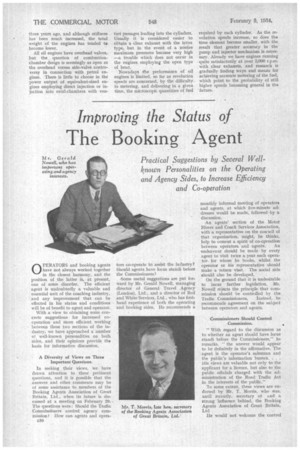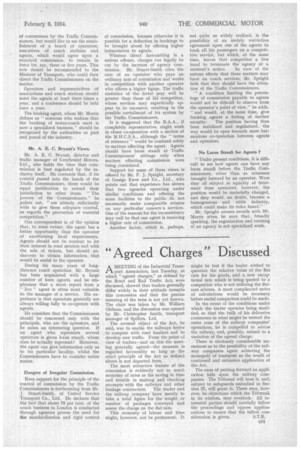Improving the Status of The Booking Agent
Page 108

Page 109

If you've noticed an error in this article please click here to report it so we can fix it.
Practical Suggestions by Several Wellknown Personalities on the Operating and Agency Sides, to Increase Efficiency and Co-operation
PERATORS and booking agents have not always worked together in the closest harmony, and the position of the latter is. at present, one of some disorder. The efficient agent is undoubtedly a valuable and essential unit of the coaching industry, and any improvement that can be effected in his status and conditions will be of benefit to agent and operator.
With a view to obtaining some concrete suggestions for increased cooperation and more efficient working between these two sections of the industry, we have approached a number ol well-known personalities on both sides, and their opinions provide the basis for informative discussion.
A Diversity of Views on Three Important Questions.
In seeking their views, we have drawn attention to three pertinent questions, and it is possible that the answers and other comments may be of some assistance to members of the Booking Agents Association of Great Britain, Ltd., when its future is discussed at a meeting on February 20.. The questions were : Should the Traffic Commissioners control agency commission? How can agents and opera
E50 tors co-operate to assist the iv dustry? Should agents have locus standi before the Commissioners?
Some useful suggestions are put forward by Mr: Gerald Nowell, managing director of General Travel Agency (London), Ltd., and a director of Red and White Services, Ltd., who has firsthand experience of both the operating and booking sides. He recommends a monthly informal meeting of operators and agents, at which live-minute addresses would be made, followed by a discussion.
An agents' section of the Motor Hirers and Coach Services Association, with a representative on the cou.-wil of that organization, might, he thinks, help to cement a spirit of co-operation between operators and agents. An endeavour should be made by every agent to visit twice a year each operator‘ for whom be books, whilst the operator or his representative should make a return visit. The social side should also be developed.
On the ground that it is undesirable to incur further legislation, Mr. Nowell rejects the principle that commission should be controlled by the Traffic Commissioners. Instead, he recommends agreement on the subject between operators and agents.
Commissioners Should Control Commission. • " With regard to the discussion as to whether an agent should have locus standi before the Commissioners," he remarks, "the answer would appear to be definitely in the affirmative. The agent is the operator's salesman and the public's information bureau. . . . His views are valuable not only to the applicant for a licence, but also to the public officials charged with the administration of the Road Traffic Act in the interests of the public."
To some extent, these views are endorsed by Mr. T. Morris, who was, until recently, secretary ot and a strong influence behind, the Booking Agents Association of Great Britain, Ltd He would not welcome the control
of commission by the Traffic Commissioners, but would like to see the establishment of a board of operators, executives of coach stations and agents, which would agree upon a standard commission, to remain in force for, say, three or five years. This rate should be recommended to the Minister of Transport, who could then direct the-Traffic Commissioners on the. matter.
Operators and representatives of associations and coach stations should meet the agents at least three times a year, and a conference should be held once a year.
The booking agent, whom Mr. Morris defines as "someone who realizes that the booking of motor-coach seats is now a specialized business," should be recognized by the authorities as part and parcel of the industry.
Mr. A. B. C. Bryant's Views.
Mr. A. E. C. Bryant, director and traffic manager of Greyhound Motors, Ltd' also holds the view that commission is best regulated by the industry itself. He contends that, if its control passed into the hands of the Traffic Commissioners, there would be equal justification to extend their jurisdiction to other items. "The powers of the Commissioners," he points out, "are already sufficiently wide to give them adequate control, as regards the prevention of wasteful competition."
Our correspondent is of the opinion that, to some extent, the agent has a better opportunity than the operator of ascertaining local requirements. Agents should not be content to let their interest in road services end with the sale of tickets, but should endeavour to obtain information that would be useful to the operator.
During his many years of longdistance coach operation, Mr. Bryant has been acquainted with a large number of keen agents, and he emphasizes that a short report from a live " agent is often most valuable to the manager of a service. His experience is that operators generally are always willing fully to co-operate with agents.
He considers that the Commissioners should be concerned only with the principals, who are the operators, and he raises an interesting question. If an agent who represents several operators is given locus standi, whom does he actually represent? Moreover, the agent can give information only as to his particular locality, whilst the Commissioners have to consider entire routes.
Dangers of Irregular Commission.
Keen support for the principle of-the control of commission by the Traffic Commissioners is forthcoming from Mr. J. Stuart-Smith, of United Service Transport Co., Ltd. He declares that the fact that about 75 per cent, of the coach business in London is conducted through agencies proves the need for the standardization and rigid control of commission, because otherwise it is possible for a deflection in bookings to be brought about by offering higher inducements to agents.
Whereas direct fare-cutting is a serious offence, charges can legally be cut by the increase of agency commission. Mr. Stuart-Smith cites the case of an operator who pays an ordinary rate of commission and works in competition with another operator who allows a higher figure. The traffic statistics of the latter may well be greater than those of his competitor, whose services may superficially appear to be excessive, resulting in the possible curtailment of his system by the Traffic Commissioners.
It is suggested that the B.A.A., if completely representative, might work in closer co-operation with a section of the M.H.C.S.A., although the "terms of reference " would be confined solely to matters affecting the agent. Agents should have locus stancli at Traffic Commissioners' sittings only when matters affecting commission were being considered. Support for some of these views is offered by Mr. F. J. Speight, secretary of George Ewer and Co., Ltd., who points out that experience has shown that two agencies operating under similar conditions and offering the same facilities to the public do not necessarily make comparable returns on any particular concern's services. One of the reasons for the inconsistency may well be that one agent is receiving a higher rate of commission. Another factor, which is, perhaps, not quite so widely realized, is the possibility of an unduly restrictive agreement upon one of the agents to book all his passengers on a competitive service, but which, at the same time, leaves that competitor a free hand to terminate the agency at a moment's notice. In view of the serious effects that these matters may have on coach services, Mr. Speight feels that they should have the attention of the Traffic Commissioners.
" A condition limiting the percentage of commission payable to agents would not be difficult to observe from the operator's point of view," he adds, " and would, at the same time, give booking agents a feeling of further security. The position having thus been stabilized and regularized, the way would be open towards more harmonious co-operation between agents and operators.
No Locus Standi for Agents ?
Under present conditions, it is difficult to see how agents can have any locus staudi before the Traffic Commissioners, other than as witnesses brought forward by in operator. Were they all subject to equality of treatment from operators, however, the position would be materially changed, and they would, no doubt, become a homogeneous and industry, which could make its voice heard.'
Mr. Speight crosses swords with Mr. Morris when he says that, broadly speaking, the organization and running of an agency is not specialized work.




































































































































































